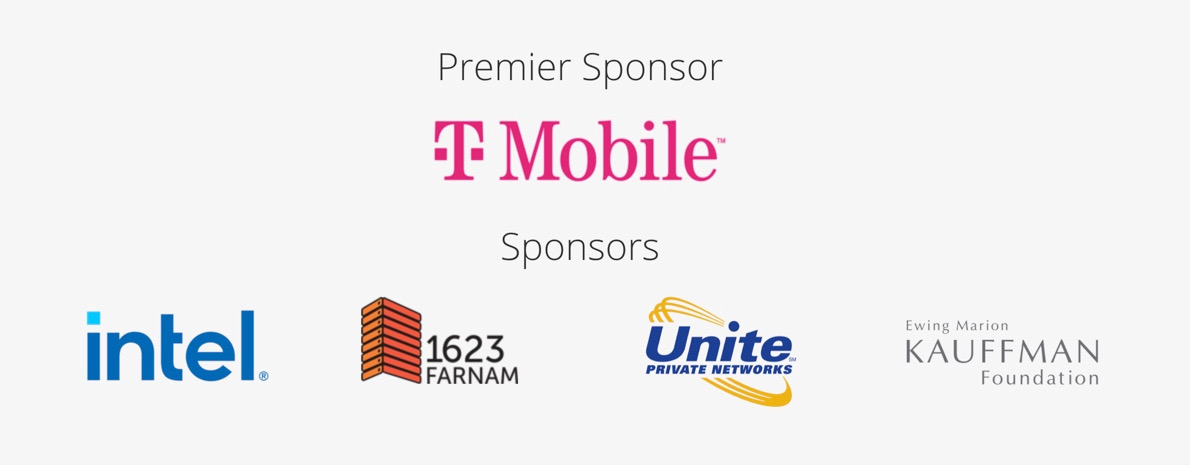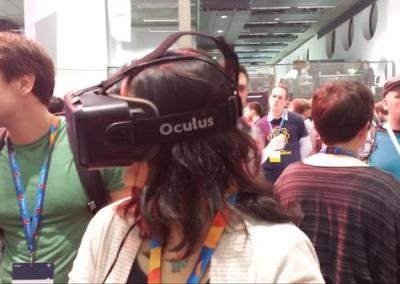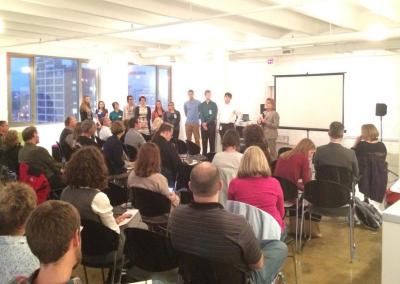Digital equity for community health workers
360-degree digital equity links healthcare to social services
Digital Equity for Community Health Workers
Community health workers (CHWs) are support personnel to the healthcare process of the people they serve. Currently, in the Kansas City region, their work especially includes linking the care environment to the social services environment. This has come about as more policy makers understand the power of the social determinants of health in patient outcomes. A patient’s housing, nutritional status and economic stability, for example, impact a patient’s physical and mental health outcomes.
CHWs work with their clients to understand how social needs might be impeding their progress with their health status, and then help to identify and navigate the kinds of support and services needed for the best possible outcome. CHWs often also collect patient information and engage patients in health promotion activities.
The federal Centers for Medicare and Medicaid Services (CMS) and most insurance companies are trying to find ways to reimburse health encounters based on the outcomes achieved. However, most reimbursement in the US still has some basis of fee-for-service. Because CHWs are relatively new on the scene, and because their work is focused more on outcomes and non-medical services, very few of their services are viewed as reimbursable.
Because of this, CHWs are supported primarily through charitable grants and a few progressive programs from insurers. There are pushes to highlight their value via decreased morbidity/mortality and decreased costs due to faster recovery time, fewer emergency room visits and more.
Because community trust is considered a key characteristic for CHWs to have a meaningful impact on health status, particularly of underserved populations, there is a conscious effort to recruit CHWs from among the populations with the greatest needs. This means that CHWs generally reflect the communities they serve. This includes having lower levels of technical skills in an economy and society where most tools for work, services, and interaction are now digital. This is where digital equity comes into play.
Digital equity refers to access to, and knowledge of, hardware, software and internet connectivity. KC Digital Drive (KCDD) knew that improved digital access would increase the progress CHWs can make with patients and make clearer their value in the health system.
KCDD developed a grant application entitled “Digital Equity for Community Health Workers.” It was approved by the Health Forward Foundation (HFF) in December of 2020.
Following an in-depth research process that involved conversations with potential stakeholders, KCDD outlined a prospective program that it could execute with substantial amounts of consulting work from the University of Missouri Kansas City and Missouri Extension. This group formed the partnership for the proposal submitted in KCDD’s name. The goal was to research and design a programmatic learning approach to help CHWs increase their comfort and effectiveness through applying technology in their various roles.
The group knew that a CHW learning program could not be workable without consultation with current CHW training and education entities. Because of this, the group included roles and budgetary amounts in the grant for the Mid-America Regional Council (MARC), Metropolitan Community College (MCC) and the Kansas City Regional Community Health Worker Collaborative.
Before submitting the grant proposal, KCDD sought to validate the perceived value digital equity would have for CHWs and potential interest in the program by interviewing several key players in the Regional CHW Collaborative. The role of CHWs in the Kansas City area was established in 2012 with federal funding that MCC received to pilot a training program along with two other community colleges in Missouri. It later received additional funding from the Health Resources and Services Administration and became the entity for all formal CHW training in the region.
KCDD interviewed relevant leadership from MARC, MCC, the Collaborative and KC CARE Health Center. These interviews demonstrated a strong need for digital skills and inclusion for CHWs. Each interviewee stressed the great diversity of CHWs’ life experiences and the fact that many CHWs are drawn from the communities that they ultimately will serve.
In response to this research and collaboration, KCDD developed a four-phase plan:
- Phase 1: Expansion of CHW level-setting and 1-on-1 interviews with stakeholders
- Phase 2: Landscape analysis via online survey of CHWs
- Phase 3: Co-design curriculum with participation of CHWs
- Phase 4: Pilot implementation of a program of resources/modules for 12-20 CHWs for a short-term trial
Phase 1 of this project is complete. It validated the knowledge the team gathered during the pre-proposal research. It reinforced that CHWs fill the role of empathetic peer consultants. Additionally, it demonstrated that the development of both hard technical skills and soft interpersonal and communication skills are important aspects of CHW professionalization. The project team also acknowledged that CHW clients often lack digital equity as well. Therefore, CHW training might incorporate increasing their clients’ digital literacy. Phase 1 also demonstrated that a library of video modules with on-demand access would be an accessible model. This takes into account varying levels of pre-module digital literacy; different levels of English language skills; and nervousness about class-style learning.
The team is currently completing Phase 2, having gotten CHW leadership feedback for the survey instrument that the team shared with the entire CHW practice community in the Kansas City region. The intention was to get a profile of the typical worker and the current levels of technology usage, and the survey was made available in both English and Spanish. More than 20% of CHWs responded, and their answers and comments, when added to the Phase 1 research, now serve as the basis for Phase 3 and a set of co-design workshops in which three CHWs join with project team facilitators to sketch out a prospective curriculum for developing digital skills and sensibilities. Special attention is being paid to certain “soft skills”, for example, how to promote effective communications via email, not simply how to operate an email application. Phase 4 is to involve a trial of that curriculum with up to twenty CHWs. Based on the feedback received from these phases, the project team will make recommendations to the Health Forward Foundation and stakeholders for a curriculum that can be supported with community resources.




